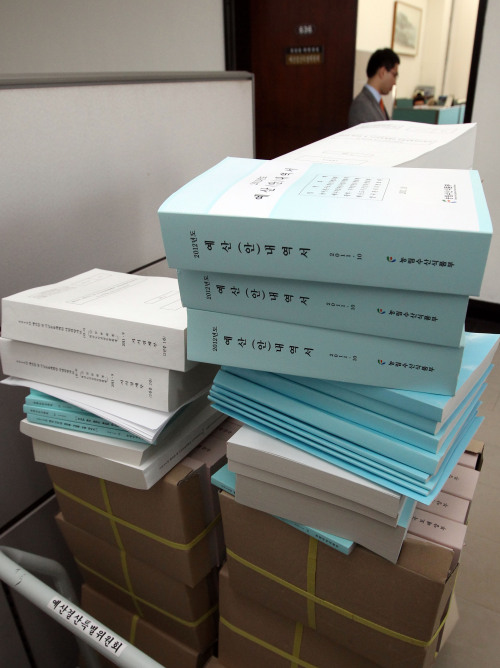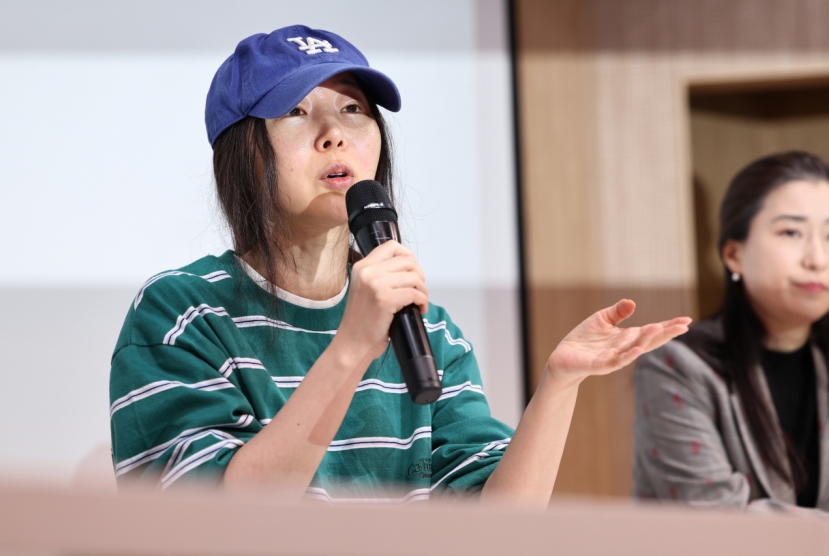Aims to chart policy direction next week, reformists suggest heavier tax for ultra-rich
The ruling Grand National Party seeks to chart a clear direction for reforms during a workshop on Tuesday in efforts to regain public support ahead of general and presidential elections next year.
The workshop will be a crucial venue for the party to discuss how to make a sweeping, fundamental makeover of its policies and personnel, officials said. It will be held at a convention hall in Gimpo International Airport in western Seoul.
The party has vowed to conduct an across-the-board revamp since its defeat in last month’s Seoul mayoral by-election.
Reforms are desperately needed for the party to turn the political tide in its favor, at a time when the public are increasingly disenchanted with established politicians.
Opposition parties’ efforts to merge and the political limelight focused on the rise of entrepreneur-turned-professor Ahn Cheol-soo have also apparently created a sense of crisis in the governing party.
At the top of the agenda is how to change policies to shake off the image of an “elitist, wealthy party,” which has largely espoused President Lee Myung-bak’s economic policies, which prioritize tax cuts.
GNP lawmakers are expected to discuss welfare policies to support middle- and low-income people who suffer from unemployment, job insecurity, and rising costs for child care and housing.
The ruling Grand National Party seeks to chart a clear direction for reforms during a workshop on Tuesday in efforts to regain public support ahead of general and presidential elections next year.
The workshop will be a crucial venue for the party to discuss how to make a sweeping, fundamental makeover of its policies and personnel, officials said. It will be held at a convention hall in Gimpo International Airport in western Seoul.
The party has vowed to conduct an across-the-board revamp since its defeat in last month’s Seoul mayoral by-election.
Reforms are desperately needed for the party to turn the political tide in its favor, at a time when the public are increasingly disenchanted with established politicians.
Opposition parties’ efforts to merge and the political limelight focused on the rise of entrepreneur-turned-professor Ahn Cheol-soo have also apparently created a sense of crisis in the governing party.
At the top of the agenda is how to change policies to shake off the image of an “elitist, wealthy party,” which has largely espoused President Lee Myung-bak’s economic policies, which prioritize tax cuts.
GNP lawmakers are expected to discuss welfare policies to support middle- and low-income people who suffer from unemployment, job insecurity, and rising costs for child care and housing.

Some lawmakers have already recommended to GNP leader Rep. Hong Joon-pyo that their party set aside some 3 trillion won ($2.57 billion) from the state budget to carry out a series of measures to improve the lives of ordinary citizens.
The party is also considering pursuing a policy to help turn irregular workers and interns at Korean firms into regular staff using public funds.
Minbon 21, a group of reformist GNP lawmakers, on Friday suggested creating a new 40 percent tax band for those who earn more than 150 million won or 200 million won per year.
The current top rate of income tax is 35 percent, applied to all those who earn more than 88 million won. Critics said that the rule was unfair, as the same tax rate is applied to high-income clerical workers and conglomerate owners.
The reformist group said that the new band is needed to enhance the fair distribution of resources and institute a system to encourage top-income citizens to fulfill their social responsibilities as part of the upper echelon.
The group also suggested a set of measures to address issues concerning irregular workers suffering from job insecurity and discrimination in terms of pay and other working conditions.
Another issue likely to be discussed at the workshop is the party’s nomination of candidates for the parliamentary elections next year.
This is crucial, as the party recognizes the urgent need to bring in fresh faces to underscore its resolve for reform. But it could reopen factional cracks in the party, which has long suffered from infighting between those loyal to former chairwoman Park Geun-hye and to Lee.
Some observers said that there would be a heated debate on the nomination process. Others, however, anticipated that the leadership might be reluctant to touch on it as a possible conflict over it could hamper reform efforts.
“A policy shift will not be accepted by the people as a great change in the ruling party. At last, how to change its personnel will be the key to reform,” a senior GNP official said.
Aware of its possible negative impact on the party renovation efforts, GNP members looked circumspect over the nominations issue.
Some political watchers said that since the elections are to take place on April 11, there would not be sufficient time to carry out a democratic bottom-up nomination process. For this, the party should draw up new nomination rules and standards.
The current top-down nomination process has long been criticized as it has apparently made the rank-and-file legislators toe the party line in order to appear loyal to the party leadership, which plays a crucial role in the nominations.
By Song Sang-ho (sshluck@heraldcorp.com)
-
Articles by Korea Herald



![[Herald Interview] 'Amid aging population, Korea to invite more young professionals from overseas'](http://res.heraldm.com/phpwas/restmb_idxmake.php?idx=644&simg=/content/image/2024/04/24/20240424050844_0.jpg&u=20240424200058)
















